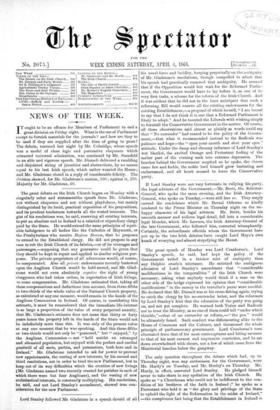Lord Stanley followed Mr. Gladstone in a speech devoid of
all his usual force and lucidity, harping perpetually on the ambiguity of Mr. Gladstone's resolutions, though compelled to admit that his speech had practically removed that ambiguity. He avowed that if the Opposition would but wait for the Reformed Parlia- ment, the Government would have to lay before it, as one of its very first tasks, a scheme for the reform of the Irish Church. And it was evident that he did not in the least anticipate that such a reforming Bill would reserve all the existing endowments for the existing Establishment,—a proposal of which he said, "I ant bound to say that I do not think it is one that a Reformed Parliament is likely to adopt." And he taunted the Liberals with wishing simply to forestall the Conservative Government in the matter. Of course, all these observations said almost as plainly as words could say that "No surrender" had ceased to be the policy of the Govern- ment,—that what it recommended instead to the Radicals was patience and hope—the "open your mouth and shut your eyes" attitude. Under the damp and clammy influence of Lord Stanley's wet blanket, the excited Orange and Protestant feeling of the earlier part of the evening sank into extreme depression. The benches behind the Government emptied as he spoke, the cheers came few and feeble, the noble lord himself grew hesitating and embarrassed, and all heart seemed to leave the Conservative party.






























